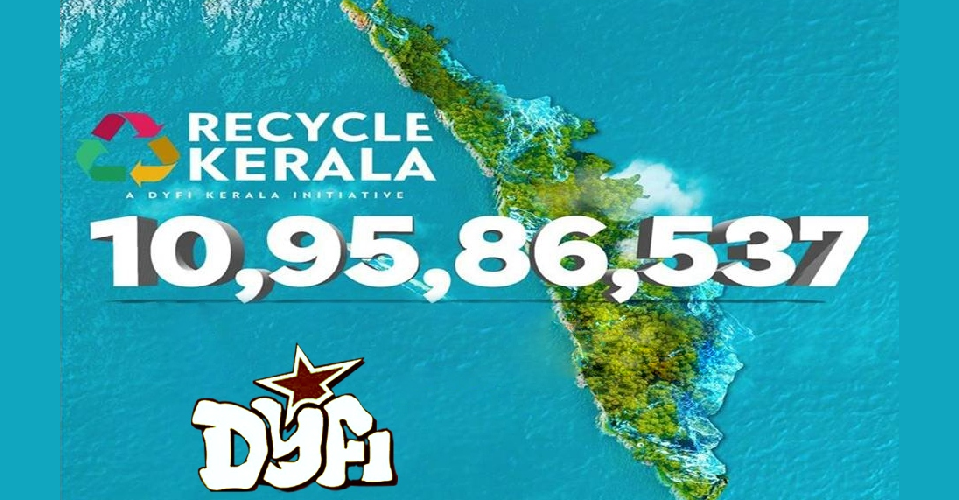Members of the Democratic Youth Federation of India in the state of Kerala raised €1.2 million by running a recycling campaign in which they collected scrap from around the state and sold it for recycling.
Ever since the beginning of the covid-19 pandemic, left-wing youth organisations around the world have been in the forefront both in providing relief and in resisting attempts to attack the rights of the people. An instance of this has been the “Recycle Kerala” initiative launched by the communist Democratic Youth Federation of India, which raised more than €1.2 million to help the state’s fight-back against the pandemic. On 6 August the state leadership of the DYFI contributed the entire amount to the Chief Minister’s Distress Relief Fund.
Kerala’s left-wing government stands out globally for its people-centred approach to combating the pandemic and has won renown for successfully combating two waves of the pandemic. The youth organisation’s initiative comes as the state deals with the third wave.
Unlike many fund-raising campaigns, Recycle Kerala involved the collection of used secondary materials from households for recycling, which were then sold by DYFI to scrap dealers and recyclers.
From May, members of all 27,240 branches of DYFI visited households in their locality, collecting books, old newspapers, damaged electronic devices, and other such items. Some households also donated valuables, such as paintings, sculptures, and other pieces of art, adding substantially to the fund.
Contributions also came in the form of farm products, including fruit, vegetables, poultry, and dairy produce. Some small-scale farmers even donated their entire produce for the season, including rice, tubers, and plantains.
In remote villages in Kerala, where farmers have found it difficult to sell their agricultural products because of the quarantine, DYFI committees purchased the produce and resold it. Other items donated were poultry, cattle, seeds, saplings, and high-yield fruit plants, which were resold. The members also sold fish that they themselves caught in inland rivers and lakes. Locally stitched and embroidered clothes, along with state lottery tickets, were also sold in some places.
One particular initiative was the cleaning of the rivers throughout the state by removing an estimated 6½ tons of plastic waste, including plastic bottles, which was then sold for recycling. Members also engaged in cleaning private wells, factories, offices, and houses.
Several popular football-players who are part of the national, state and local teams donated their jerseys, which were then auctioned by block committees.
In a number of places the DYFI ran small eating-places, selling local delicacies at lower prices. They also provided cheap local transport in places with limited connectivity. Various artists who are members of DYFI conducted spot caricature drives and street concerts, while adhering to covid-19 safety protocols.
Along with all these efforts DYFI members joined in the work at building sites, farms and markets and contributed their earnings.
Though this initiative did not receive any coverage in the mainstream corporate media, the effort and contribution of DYFI was well received on social media. On 7 August, in his official press briefing, the chief minister of Kerala, Pinarayi Vijayan, acknowledged and appreciated the initiative of DYFI as a model for the world to follow. “This initiative will be remembered as a hallmark of the valour of the youth in our state,“ he said, “who are ready to fight for the common good, braving all adversities.”
The Youth Brigade volunteers from DYFI have been active in relief and rescue efforts for the people affected by heavy rains and floods. In June more than 11,000 devices, including televisions, mobile phones, iPads, tablets, and laptops, were delivered free by DYFI to students from deprived sections of the population, enabling them to participate in the temporary on-line classes.
Apart from these efforts, the cleaning and facilitating drive by DYFI for covid-19 treatment infrastructures throughout the state, including the Covid First-Line Treatment Centres, began in March, and a chain of co-ordinated relief activities during the quarantine also received much publicity and appreciation from civil society.






